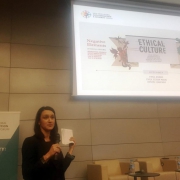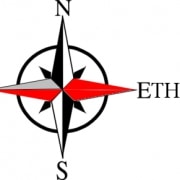2017 End of Year Letter from Jonathan Haidt and Azish Filabi
Dear Friends,
2017 has been a year of surprises, transformation, and growth. Thirteen months ago, on the morning after Election Day, we walked in to the conference room of a global consulting firm based here in New York City. We sat down at a long table with 30 ethics and compliance officers. We gave our talk as planned—a talk on designing ethical systems. But all of us around the table were in a state of…surprise to say the least. Our conversation focused primarily on the consequences of the rather unexpected election of Donald Trump. What were the implications for businesses? How would rules and enforcement change?
Now, a year later, it is clear that whatever regulations are rolled back, businesses face an ever-changing landscape of ethics challenges. Questions of business ethics and ethical culture are front and center in national discussions on sexual harassment in the workplace, diversity and inclusion (which may include viewpoint and political diversity, as we learned in response to the famous “Google memo”); fairness and cheating, and new pressures on leaders to take stands on political controversies. We are on a path to further deregulation of business. The compliance workload may decrease, but the ethics workload will likely increase. This is the time for the business ethics community to show that, together, we can create a better society through ethical business behavior.
A Year of Collaborations and Research
To play our part in this challenging time, we have developed resources, initiatives, and capabilities in several ways. First: We have added two new collaborators:
1) Professor Celia Moore, of the Department of Management and Technology at Bocconi University, a leader in the study of building organizations that are ethically resilient; and
2) Professor Marshall Schminke, the BB&T Professor of Business Ethics at the University of Central Florida, whose research on behavioral ethics and organizations has advanced thinking on the role of organizational context to promoting ethical decision-making.
Both Celia and Marshall have been key contributors to Ethical Systems, through the Ethical Systems Culture Measurement Working Group and presentations at forums, such as the Ethics and Compliance Initiative (ECI).
A second area of growth for us has been in writing. Our core team wrote the following pieces:
- An essay for the Davos World Economic Forum titled Ethical Systems Design: What smart leaders are using to improve their organizations (and the world). We noted how ethical organizations can help improve one of the most critical issues of our time— income inequality;
- A free e-book titled Head to Head: A conversation on behavioral science and compliance, written by Jeff Kaplan and Azish Filabi, created for anyone interested in improving the effectiveness of compliance and ethics programs through the use of behavioral science research;
- A collaborative white paper with The Mind Gym titled The Only Way is Ethics, presenting research on why traditional solutions to managing ethics aren’t working, while also providing a set of tools and a framework to begin diagnosing your own organization;
- An essay in Nature: Human Behavior, titled Make Business Ethics a Cumulative Science, by Jon Haidt and ES collaborator Linda Trevino.
- The Behavioral Science and Policy Association’s journal, Behavioral Science & Policy, will feature in their upcoming spotlight issue this winter, co-edited by Jonathan Haidt and Azish Filabi, articles by ES Collaborators on topics including regulating ethical culture, how to treat ethics as a design problem, and how behavioral ethics can help reduce misconduct.
- We filed an amicus brief with the Supreme Court in the Digital Realty Trust v. Somers case, advocating that the Court protect internal whistleblowers under the Dodd-Frank Act.
Our twenty-three ES Collaborators have been busy writing all year too. You can find highlights from their publications on our 2017 Ethical Systems Collaborators Highlights post.
Our blog continues to bring important news and ideas to our readers, including a new “Ask an Ethics Expert” series. This year we published 40 blog posts, the most popular of which were Are We In a Compliance Arms Race? by Azish Filabi; Airlines and Stakeholders: A first class relationship by David Newman; and A Long-Term Fix for our Short-term Focus on Profits by Jeremy Willinger.
Next Steps and the Way Forward
From our launch in 2014 through today, our mission remains to help build better societies through ethical business behavior. The short essay in Nature that we referred to above lays out a brief but comprehensive vision of how Ethical Systems can advance this mission:
Improving business ethics is not a one-time achievement… We need to…generate a constant stream of innovations in business ethics, which are then tested empirically and selected so that the most effective ones become more common throughout the business world, while those that are ineffective or counter-productive fade away.”
By bringing researchers and practitioners together in the most constructive and collaborative ways, we can build a research infrastructure that advances the goals of business through the use of the tools of social science. The development of validated and widely-used assessment tools is a first step towards this goal. Such tools are critical for Executives and Boards of Directors who seek to be responsive to regulators and other stakeholders about how they are managing their ethical culture. At present most companies do not measure their ethical cultures, cannot track improvements, and don’t know which of several proprietary and costly surveys they would use if they wanted to do so. We are going to provide a well-validated open-access suite of assessment tools.
This year, we expanded our research infrastructure by developing a new framework for our core Ethical Culture Survey, and have a validated, evidence-based survey available for use by companies. We have also responded to the increasing needs by organizations that wish to have tools to address workplace voice and inclusion by developing a new instrument — the Speak-up Culture Assessment. Employee voice is a key element of any healthy culture, and our research explores the challenges for employees to feel heard, and the demands on executive leaders to be responsive to these changing dynamics, particularly given the pressures of social media and shifting norms of political discourse. The assessment, combined with a new training platform, will enable employees to speak more skillfully and confidently across a variety of kinds of divisions. If you’d like to assess these dynamics in your organization, please contact us for further information.
Looking ahead to 2018 and beyond, Ethical Systems will create a model for collaboration between businesses and researchers, whereby businesses get access to the best ethics researchers from academia, who can propose and test ideas for ways to improve trust, fairness, and other aspects of ethical culture, using the measures we developed. These collaborations will create vast datasets that can be used to study ethical behavior in organizations and to develop predictive analytics for improving ethical cultures and conduct. These networks will enable efficiencies and innovations that for any one researcher would take years to create. Through our collaborative model, together we can generate new systems to study and design ethical systems, equipping ethical business to play a key role in advancing prosperity.
In this year when the Nobel prize in economics was awarded to Richard Thaler for his work on behavioral economics, the power of “nudges” and social science research to improve the functioning of complex organizations is clear for all to see. As government regulation and oversight decreases, businesses will have greater autonomy to decide how they want to operate. We know that many want to maintain and improve their ethical organizational cultures. We’re here to help.
May you all have a healthy, happy, and scandal free 2018.
Jonathan Haidt, Director
Azish Filabi, Executive Director







